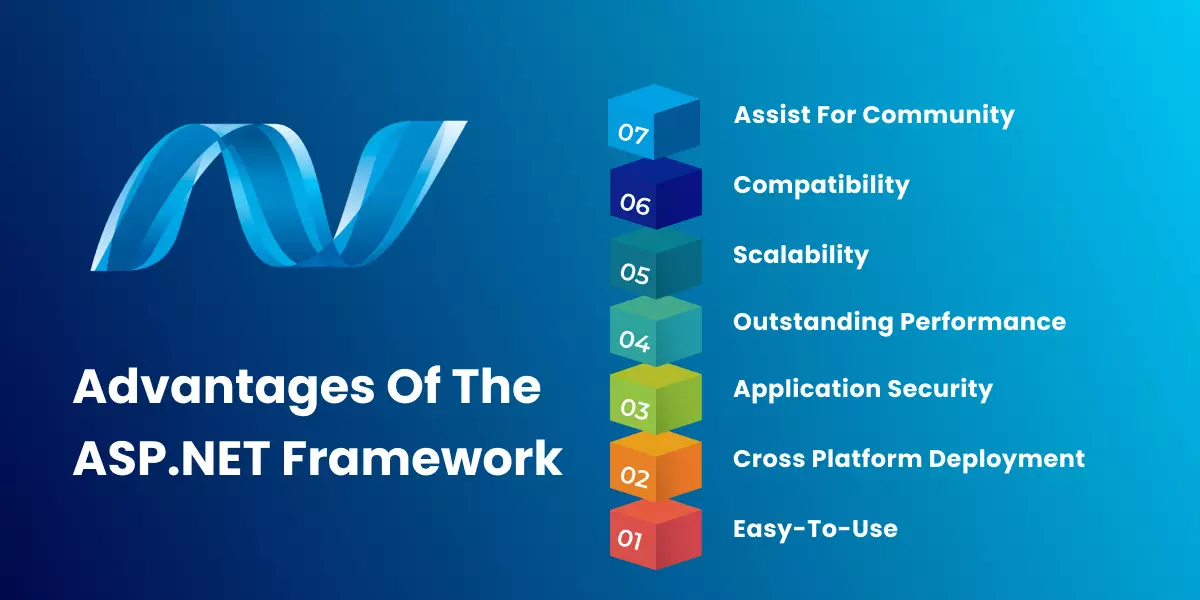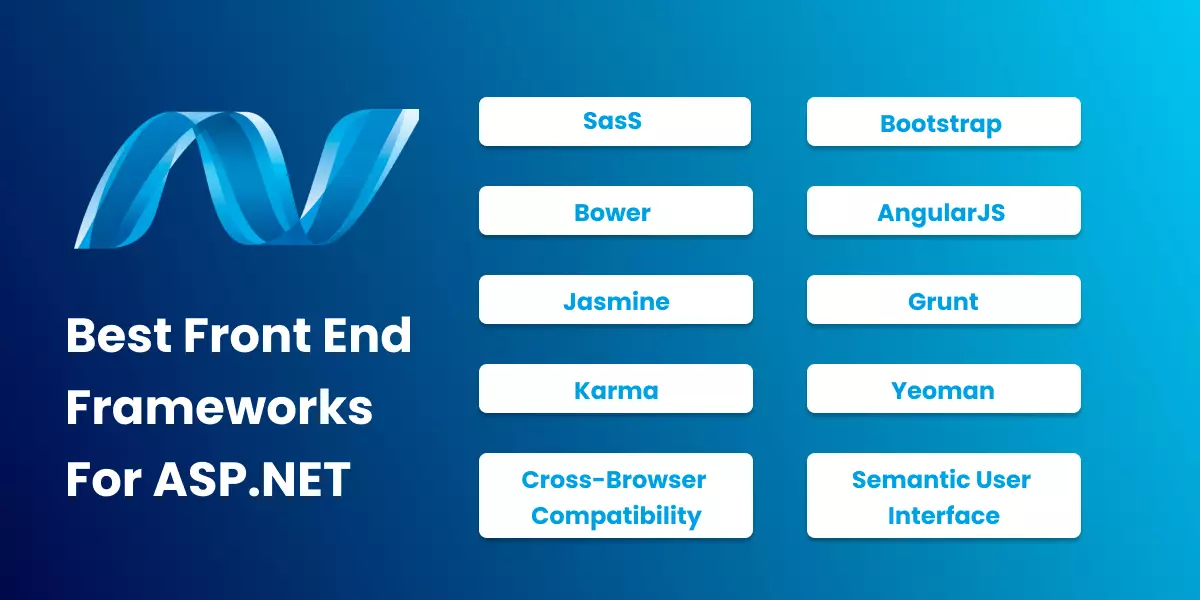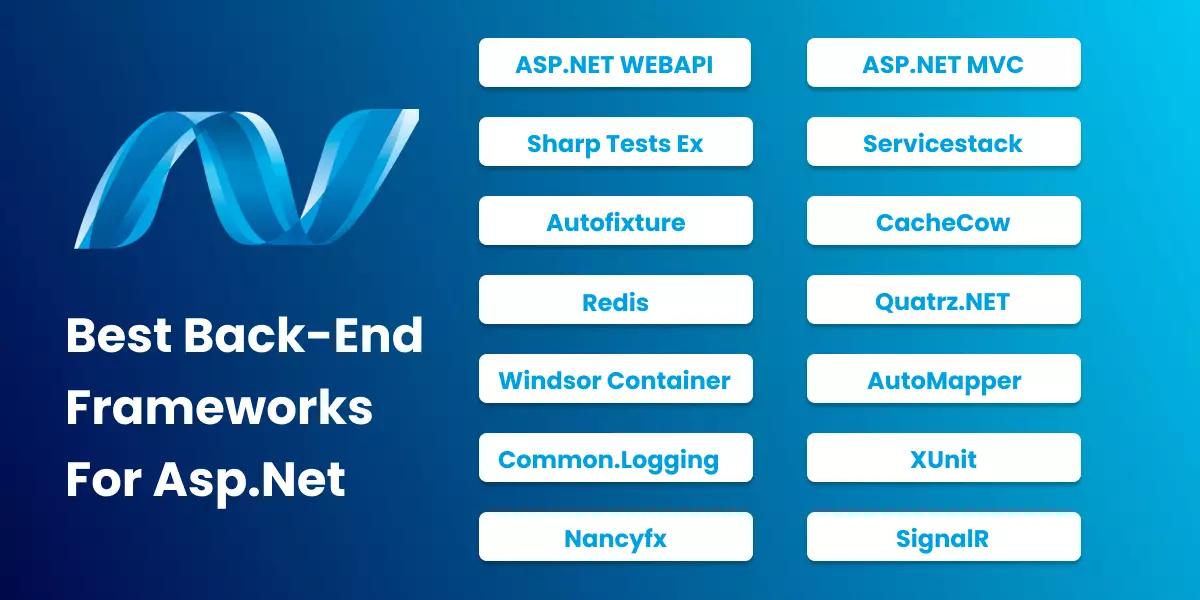ASP.NET is a versatile web framework from Microsoft that supports both backend and frontend development. It enables developers to create dynamic web applications and services by utilizing the Common Language Runtime (CLR) for flexibility with languages such as C#, VB.NET, and F#.
With benefits like as ease of use, cross-platform deployment, security features, speed optimization, and scalability, ASP.NET remains a popular choice for enterprise-grade applications.
When it comes to frontend development, ASP.NET works flawlessly with frameworks such as Sass, Bower, Jasmine, Karma, Bootstrap, AngularJS, Grunt, Yeoman, Semantic UI, and more.
For backend development, ASP.NET provides frameworks such as WebAPI, MVC, Sharp Tests Ex, ServiceStack, Autofixture, CacheCow, Redis, Quartz.NET, Windsor Container, AutoMapper, Common.Logging, XUnit, Nancyfx, and SignalR, which provide solid solutions for a variety of requirements.
What Is Asp.Net?

Microsoft's web framework, ASP.NET, is an all-inclusive web development environment used for dynamic website applications, websites and services.
Part of the.NET Framework programming model that facilitates creating enterprise-level Windows apps ASP.NET Core can also be utilized. However, these two versions should not be considered equivalent. The Asp developer hire cost varies depending on factors such as experience, location, and project requirements.
ASP.NET frameworks takes advantage of the Common Language Runtime (CLR), enabling developers to write applications using any.NET programming language, including C#, VB.NET and F#.
ASP.NET allows programmers to design dynamic web pages that interact with databases while handling requests and producing active output; its powerful server-side scripting language can also help make web applications. As per Builtwith, ASP is the 3rd most popular in the United States in Frameworks category.
Advantages Of The ASP.NET Framework

Here are some advantages of ASP.NET:
- Easy-To-Use: ASP.NET was designed to make web development more straightforward and powerful, featuring an expansive library containing most of the code necessary for building elements and features of websites.
- Cross Platform Deployment: With ASP.NET, you can develop applications compatible with all major operating systems and browsers. It allows for rapid deployment across platforms while making apps consistent across browsers.
- Application Security: ASP.NET offers an environment in which experienced developers can develop applications securely. The platform features user authentication and authorization systems that control access to resources via code.
- Outstanding Performance: ASP.NET is an exceptional environment for building web applications. It optimizes performance using caching and other techniques to deliver excellent end-user applications.
- Scalability: ASP.NET was created explicitly for maximum scalability, making it one of the premier web development frameworks suited for creating applications that can manage large volumes of traffic. As such, it remains one of the exclusive development solutions available when building dynamic enterprise-grade apps with high volumes of visitors.
- Compatibility: ASP.NET can be utilized with various databases, operating systems and web servers.
- Assist for Community: As an open-source project, ASP.NET enjoys widespread support from its community of developers and The.NET Foundation.
Best Front End Frameworks For ASP.NET

SasS
Sass is a scripting preprocessor language often used to extend CSS by providing features like variables, nesting and mixins - providing more flexible and extensible CSS codes.
Sass can be leveraged within an ASP.NET build system to compile Sass into CSS code. At the same time, third-party frameworks like Gulp and Grunt may help developers accomplish this process by providing tasks that allow the transformation of Sass into CSS code.
Utilizing SASS with ASP.NET offers numerous advantages.
- SASS improves readability by helping you structure and organize code more clearly, which makes it simpler for others to comprehend and comprehend your work - this feature can especially come in handy when working on large projects.
- Automation-SASS offers various automation tools to facilitate development. These powerful tools include variables, functions and mixins, allowing more effective code writing.
- SASS gives you the power to write well-structured and performance-optimized code to enhance the speed of your app.
Cross-Browser Compatibility: SASS makes it possible to develop code compatible with multiple browsers, helping ensure all applications designed using SASS appear and perform as intended on any platform.
Bower
Bower is an application package manager. It helps you track and manage the web components essential to your project - such as frameworks, libraries and assets - by installing, updating or uninstalling them as desired.
Install the Bower Package Manager into Visual Studio to use Bower with ASP.NET. Once it's set up, packages can be managed using its console or command line interface - Bower automatically resolves dependencies and downloads all required packages automatically.
Bower is a package manager which allows users to manage ASP.NET code.
- Easy Installation-Bower, a straightforward command-line utility, makes installing packages into ASP.NET applications quickly and painlessly. Setup requirements are minimal compared to more complicated enterprise solutions; users click and install.
- Dependency Management simplifies package dependency management by automatically installing its components, making upgrades simpler than ever. Bower also auto-installs them to reduce the manual effort required when upgrading packages.
- Automated Updates - Bower can detect updates for your applications automatically and install them, saving time by eliminating the need to upgrade manually.
Jasmine
Jasmine, a popular open-source JavaScript testing core framework, is very user-friendly and designed as a flexible yet straightforward environment for testing JavaScript code.
Jasmine can be used without issue in ASP.NET environments, such as AJAX requests or client-side validation tests.
In contrast, server-side code, such as MVC Controllers, can also use the Jasmine testing framework. Jasmine is an invaluable testing runner for ASP.NET applications.
- Flexibility: Jasmine provides a flexible cross-platform framework for code testing that can easily accommodate the needs of an ASP.NET application, giving developers ample room to tailor tests accordingly for each specific project.
- Automation: Jasmine allows developers to automate the testing of an ASP.NET app, making testing quicker and reducing the development effort needed to produce reliable code. This reduces testing times significantly.
- Ease of Use: Jasmine's user-friendliness allows developers to quickly build reliable and accurate test cases. It ensures their code has been thoroughly examined before going live. This also makes them faster in troubleshooting potential errors within codebases.
Karma
Karma is an open-source JavaScript test runner used for automating browser and Node.js tests with frameworks like Jasmine or Mocha to automate the testing of modern web applications.
Karma is an ASP.NET test automation tool capable of running client- and server-side tests. For instance, this allows it to test user interface functionality like clicking buttons or submitting forms as well as backend code such as API calls and database calls.
Karma is an outstanding ASP.NET tool for testing code in ASP.NET applications.
- Efficiency: Karma facilitates quick and effective code testing with parallel running tests - saving time and resources - making it ideal for testing large ASP.NET enterprise web apps.
- Karma is a highly flexible framework. You can configure Karma to run different types of tests, such as integration, unit, or end-to-end tests across multiple devices and browsers.
- Automation: Karma makes automating tests easy. Set your tests beforehand or manually trigger them as desired - plus its integration with popular continuous integration productivity tools such as Jenkins makes automating tests in production environments much simpler.
Bootstrap
Bootstrap is an open-source HTML/CSS/JavaScript framework used for quickly building responsive mobile-first websites and tailored explicitly towards developers who wish to rapidly produce websites compatible with all browsers.
Bootstrap allows ASP.NET developers to develop highly scalable, responsive websites rapidly. Bootstrap is explicitly designed to work within ASP.NET environments - include its CSS files and JavaScript in your project before linking back through the master page, referencing them, and using Bootstrap classes for the desired look and feel of the website.
Bootstrap is an open-source frontend framework that can be integrated with ASP.NET for creating web applications.
- Bootstraps Responsive design makes creating websites with responsive designs easy, no matter the device or screen size that your visitors are on. Bootstrap automatically adapts itself according to what device it detects - whether a desktop computer, laptop, tablet or phone.
- Bootstrap comes preloaded with many components like buttons, tables, forms and navigation bars that can easily be added into an ASP.NET app quickly.
- Bootstrap parts are easily customizable and can promptly meet the needs of an application, providing developers with an opportunity to change their appearance or feel through just a few lines of code.
AngularJS
AngularJS, a JavaScript-based front-end web application framework maintained open-source by Google with help from an international community of individuals and companies, helps developers overcome many of the difficulties of developing single-page apps.
AngularJS Framework can be integrated seamlessly with ASP.NET by including its libraries within your project and creating customized components and services using it within it.
Custom AngularJS can provide interactive user interfaces and data access through Web services offered by ASP.NET Web services.Here are the advantages of using AngularJS with ASP.NET:
- AngularJS makes integration simple for existing ASP.NET projects, enabling you to add components from this framework quickly.
- Rapid Development - Angular JS provides an efficient framework for fast web app development. Development times can be reduced significantly, enabling more closed project completion times.
- Reusable Components - Reusing components can dramatically speed up custom web applications development time while helping ensure consistency of customer experiences. With Angular JSs flexible tools for building reusable components quickly and effortlessly, creating them should not be an ordeal but an enjoyable task. You can add new modules effortlessly.
Grunt
Grunt, a JavaScript task runner built on Node.js, automates repetitive processes such as minification and compilation, unit tests and linting, among many others.
When integrated into an ASP.NET website, it can perform additional repetitive tasks, including bundling JavaScript/CSS code into bundles for unit testing runs, copying files into production servers, etc.
Grunt ASO provides an automated way of automating routine tasks such as the deployment of mobile applications onto FTP or web servers, making Grunt an indispensable part of developing web apps using ASP.NET technology.
- Automate Common Tasks - Grunt allows you to automate tasks such as minification and compilation for quicker ASP.NET app development projects. Setting this up ahead of time saves both time and effort when building these types of projects.
- Integration With Other Tools- Grunt is designed to work alongside other development tools like Yeoman or Bower to automate additional tasks and speed up development processes.
- Grunt allows you to tailor your build by setting up custom tasks and configurations for every step.
Yeoman
Yeoman provides modern web apps with scaffolds. It can generate an ASP.NET scaffold with a basic folder hierarchy, build automation and starter templates suitable for MVC, WebAPI or SignalR applications, and install libraries/frameworks such as Bootstrap jQuery or Knockout.js.
Yeoman makes creating and running your ASP.NET app faster with quick project templates that make coding a snap. Here are a few other advantages of incorporating Yeoman when building apps:
- Yeoman provides you with an efficient tool for quickly creating new projects. It allows you to generate the basic structure for an ASP.NET app quickly, complete with required files and directories- saving time and energy in starting a new venture.
- Yeoman templates that can be tailored-Yeoman allows users to build templates to generate projects quickly.
- Integrates With Other Tools-Yeoman can efficiently work alongside tools such as Grunt or Bower to automate various tasks related to building, testing and deploying ASP.NET Applications.
Semantic User Interface
Semantic UI provides a framework to build user-friendly and responsive web apps using natural language principles as the basis of its components.
Install and include the Semantic UI Library into your project to use Semantic UI in ASP.NET applications. Semantic UIs JavaScript and CSS components provide endless styling possibilities when styling any user interface element for an ASP.NET app.
Semantic User Interface design offers many advantages when developing web apps.
- Modern, intuitive design-Semantic user interface design principles based on natural language help users comprehend and utilize web apps more quickly and efficiently.
- Semantic UX is designed to be responsive, adapting automatically to fit each device based on size and orientation. This makes creating enterprise applications that look appealing on various platforms much simpler.
- Semantic UI can be tailored to suit the unique requirements of every organization.
Read more: Unleashing the Power of Asp.Net Developers: Guide
Best Back-End Frameworks For Asp.Net

Here, you can learn about some of the top backend frameworks for ASP.NET projects:
ASP.NET WEBAPI
ASP.NET WebAPI (pronounced ASP net WEB API) is an easy and flexible framework to build HTTP services to reach multiple client devices and browsers at the same time, including mobile phones and browsers.
Asp.net serves as an ideal platform to develop RESTful applications using the.NET Framework; creating HTTP services that reach many different client devices is made effortless through this tool.
ASP.NET Web API makes it possible to build services using any HTTP method, such as GET/POST/PUT/DELETE, while supporting all available features of HTTP, including URLs and request/response heads as well as content types, versions and media types.
ASP.NET MVC
Microsoft developed the ASP.NET MVC web app framework as part of their model-view-controller (MVC) pattern for web application creation, offering an alternative to the popular Web Forms technology.
MVC divides an application into three essential logical parts - model view controller (MVC). MVC can help dynamic websites with data-driven functionality be easily created using its framework.
Make an ASP.NET web development project using Visual Studio to utilize this platform.
Your new project will come equipped with all the files and folders necessary for MVC application development, allowing it to be tested locally before uploading onto the production server for deployment.
Sharp Tests Ex
Sharp Tests Ex is an ASP.NET testing framework that makes developing tests quick and simple for developers of web-based apps using Microsoft ASP.NET technology.
With its simple test creation syntax, parameterized/data-driven testing support and assertion library, it enables rapid test execution and parallel tests, which reduce execution times significantly.
Servicestack
Servicestack, an open-source web services framework, offers an alternative to ASP.NET Web APIs, WCF and SOAP that is lightweight, simple and fast - ideal for rapid application development and deployment within platforms - as a lightweight framework.
Support across Windows, Linux, and Mac (including macOS). It makes creating web services simpler. Its modular structure also ensures high extensibility while staying compatible across many OSs, including all major.NET environments, including OSX.
Service stack offers developers numerous benefits, such as type-safe requests, messaging-based client/server communications, and simple yet lightweight web services that support multiple languages and frameworks such as ASP.NET and JavaScript.
Autofixture
Autofixture, an open-source library in.NET, makes it possible to generate test data automatically for unit testing purposes.
With Autofixture, you can quickly create objects, collections of objects and other objects to use during unit tests; anonymous test data generation in ASP.NET application controllers for unit testing or filling databases with test data to run integration tests is also supported by this powerful library.
CacheCow
CacheCow, an ASP.NET Library, provides concurrency and caching control for Web API Services. This tool can help add ETags, Last Modified dates, HTTP caching headers or any other HTTP caching to responses received via Web API services.
In-memory caching using Redis is also implemented so clients make fewer requests to a server, thus improving its overall performance.
CacheCow can easily be integrated into existing ASP.NET Web API projects via NuGet Package and is one of the critical reasons that applications perform more optimally when used under high-traffic use cases.
Redis
Redis is a free and open-source in-memory database and message broker designed to retrieve frequently accessed data quickly.
Caching systems such as Redis can enhance performance in ASP.NET apps by increasing scalability while offering external data access capabilities.
Redis can be used to cache database queries or store session state. Furthermore, Redis can also act as an event broker, webhooks server, or notification system.
Quatrz.NET
Quatrz.NET is an open-source job scheduling system developed specifically for.NET programs. Quartz.NET simplifies scheduling tasks in your.NET apps by providing access to short- and long-term schedules with full functionality for scheduling everything from quick studies to large enterprise systems.
Quartz.NET is a highly flexible ASP.NET component used to run and schedule background tasks like sending emails, performing maintenance work or processing data.
Quartz.NET can even trigger HTTP requests to refresh cached information automatically.
Windsor Container
Windsor Container for.NET Platform implements Inversion of Control to manage object dependencies within applications.
Developers register components inside this container that they later need when injecting or recording new apps. When required, Windsor allows these components to be resolved or injected back into other objects when necessary.
Windsor Container is an efficient tool designed to improve testability and maintainability in ASP.NET code by clarifying dependencies among objects while permitting developers to easily switch out components with alternative implementations (mock objects) during unit tests.
AutoMapper
AutoMapper, an object-object mapping tool, allows developers to map values between objects of various types without writing code - this makes the device highly suitable for retrieving information from databases or mapping values to models.
It has become widely utilized across ASP.NET applications as a powerful way of mapping between types. AutoMapper can be used to bridge domain models and view models or to flatten nested objects.
Install and configure AutoMapper NuGet Package mappings before calling its Map method for objects from one type into another.
AutoMapper can be downloaded using the Nuget repository from within your ASP.NET Development Environment, or you can build from scratch using Tar.gz or zip files.
Common.Logging
Common. Logging, an open-source logging solution designed for .NET applications, is an abstracted logging framework enabling developers to configure and switch easily between various frameworks while simultaneously supporting multiple concurrent use cases.
Common. Logging is an ASP.NET feature for recording application messages, performance data and exceptions. Logs may be written into either Windows Event Logs or text-based files or databases depending on how Common Logging was configured in ASP.NET; its API provides functionality to record messages as they come through.
XUnit
XUnit, the unit-testing framework developed for Microsoft.NET Framework, is an invaluable tool that lets you efficiently test code to ensure it performs as desired.
Add XUnit to ASP.NET by downloading its NuGet package, writing tests with Visual Studio Test Explorer and running them from the command line using the xunit.console.exe utility.
Nancyfx
Nancyfx is an open-source, lightweight web framework that empowers developers to quickly build web apps and services using MVC patterns for creating web apps, services and simple web pages on both.NET Framework and Mono platforms.
ASP.NET platforms such as Nancyfx-powered pages provide further development possibilities.
Before using Nancyfx with ASP.NET, installing its package is required. After doing so, either create a Nancyfx project with Visual Studio or integrate Nancyfx Library into an existing project using its route engine to direct requests directly to controllers and views in Nancyfx projects.
SignalR
SignalR is a free library designed to facilitate real-time communications between server and client in real-time, making real-time integration much simpler for applications like chat apps, real-time dashboards, gaming or collaboration tools.
SignalR can be utilized within ASP.NET to establish persistent connections that enable bi-directional communication between client and server, along with automatic reconnections, message buffering and latency optimization features.
Additionally, SignalR offers automatic reconnections, message buffering capabilities and latency optimization features for improved user experiences.
Want More Information About Our Services? Talk to Our Consultants!
Conclusion
Asp.net simplifies web programming on the Internet. Asp.Net Development Company allows us to design our projects and can be applied anywhere - big or small projects alike.
C# for .NET developers offers a powerful and familiar environment for creating robust software applications. Microsoft controls it so it will never become outdated technology; they have invested significantly into its development and community efforts, and therefore, ASP.NET should remain the preferred web programming framework over the coming five years.
Are you looking to hire an ASP developer online for your project? .DEV provides access to skilled ASP developers for your needs.
